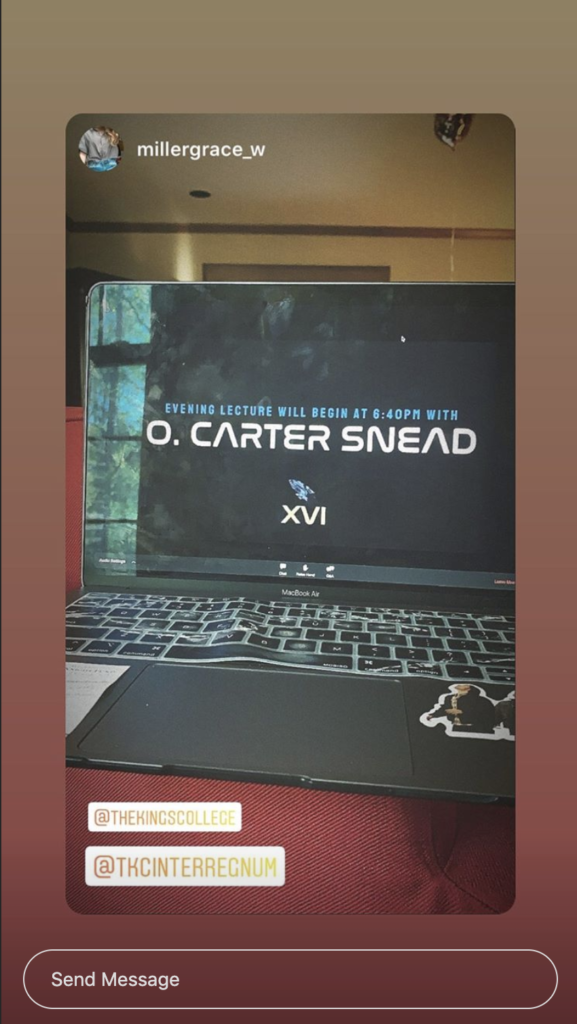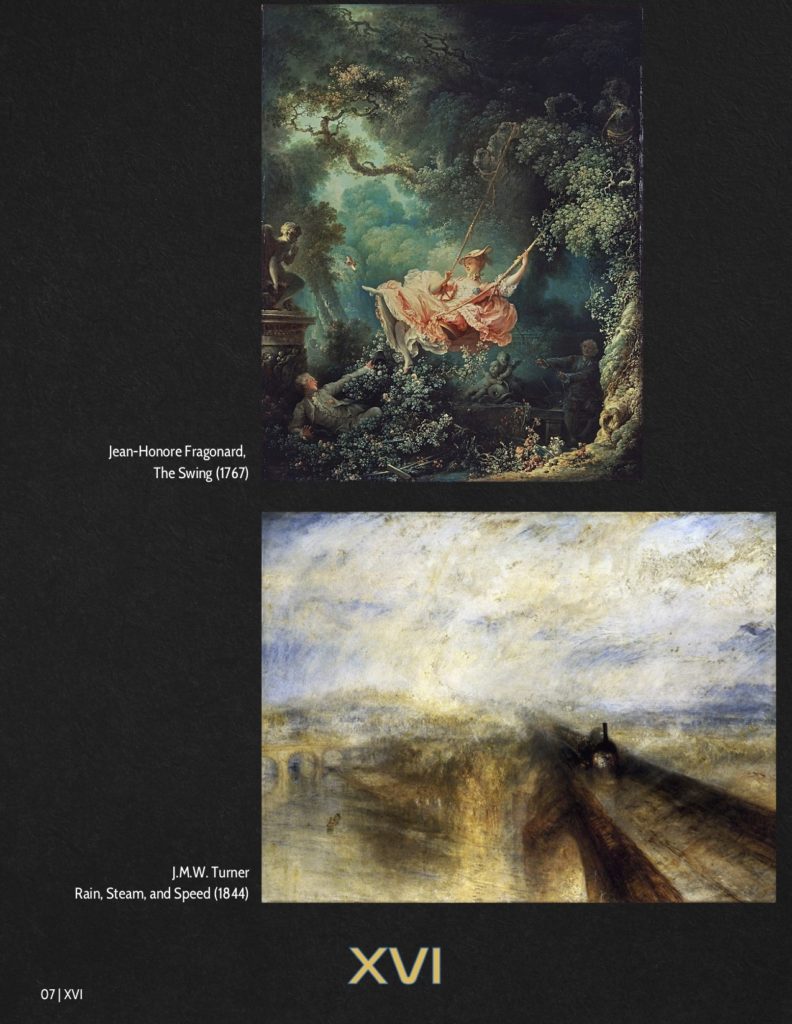Virtual Spring Interregnum XVI
On April 1-3, King’s students competed in the Interregnum XVI spring conference. During Interregnum, students showcase their talents and represent their House in various competitions, earning points towards the House Cup.

On April 1-3, King’s students competed in the Interregnum XVI spring conference. While last academic year saw the addition of the fall film festival, the 2019-20 year was the first that Interregnum was fully split between the fall and spring semesters, a change intended to increase student engagement with the theme throughout the entire academic year.
During Interregnum, students showcase their talents and represent their House in various competitions, earning points towards the House Cup. This year, students read Brave New World by Aldous Huxley and the Epistle to the Philippians to reflect upon this year’s theme: progress.
Due to the unusual conditions caused by COVID-19, the Interregnum Committee reoriented the events to suit a virtual medium. Students remotely attended the opening lecture and the debate rounds via Zoom. Creative Writing was already conducive for a virtual format, while Video Lecture replaced Unprepared Lecture and 3-Hour Art transferred to a digital format.

The competitions began on Wednesday night with a lecture by O. Carter Snead, Professor of Law, Concurrent Professor of Political Science, and the William P. and Hazel B. White Director of the Center for Ethics and Culture at the University of Notre Dame. In his lecture, Snead outlined the issues with how the modern legal system misunderstands bioethical issues. According to him, the dominant philosophy driving many vital conflicts is expression individualism, which “is a vision that cannot and does not make sense of the lived reality of human embodiment (e.g. vulnerability, reciprocal dependence, and natural limits), and is thus not a fit foundation for public bioethics.”
Snead believes the richest way to understand public policy issues related to bioethics (such as abortion, assisted reproductive technologies, or end of life decision-making) is through an anthropological lens that considers questions like, “What vision of the human flourishing does this law assume?” Snead proposes that policy makers reform their understanding of human flourishing to include the lived reality of embodied beings.
Thursday morning began with three rounds of Parliamentary debate. Motions included “This House believes that Christian politicians should use their public platform to preach the gospel” and “This House believes that absolute monarchy (e.g. Carolingian France under Alfred the Great) provides an ethical and efficacious alternative to modern, Western democratic political regimes.”
Between debate rounds, Houses worked to finish producing their 3-hour Art and video lectures, both due at 6:00pm. “3-Hour Art” no longer had a 3-hour time limit due to the adjusted online medium. This year, the prompt was to add a sixth piece of art to a collection of art pieces, reflecting the culture and values of different art movements, including The Swing by Jean-Honore Fragonard and Rain, Steam, and Speed by J.M.W. Turner. In order for a piece to be successful, it had to accomplish three things: incorporate motion into its design, possess a meaningful thematic and/or aesthetic connection to the pieces that came before, and give insight into the theme of progress.

The House of Dietrich Bonhoeffer received first place for their piece entitled Progressive Reality. They used M.C. Esher’s iconic Relativity as their inspiration. In the architectural structure created by Escher, figures climb various staircases whose point of gravity and direction are a matter of perspective. The House of Bonhoeffer added a pastiche twist, exchanging Escher’s figures for cultural icons such as Mark Zuckerberg, Michael Jackson, and Caitlyn Jenner. According to the description, the piece aimed to depict the idea that “Progress is Relative.”
For the Video Lecture competition, each House received a randomly-selected, distinct, one-sentence prompt based on Brave New World as well as one of various selections from pieces such as Chesterton’s Orthodoxy and Matthew Arnold’s poem, “Progress.” The rubric permitted a wide range of video genres, judging according to the chosen genre. The House of Dietrich Bonhoeffer received first place for their video lecture of a news debate, acted out by Will Comer (Humanities ’22), Chris Davis (PPE ’21), and Jackson Holliday (RTS ’22).
Creative Writing was due at midnight on Thursday. Thus, students were prompted to write a sci-fi story where Christianity plays a major role in the plot. Students had the option to write short stories, plays, or poems, each with their respective word limits.
The House of Susan B. Anthony received first place in this competition for their piece created by Sarah Stettheimer (Humanities ’20), Ellen Coy (English ’22), and McKenna Morgan (English ’20) entitled: “A Record of the Life of Leo Baumann.” In this futuristic story, humans have become bizarrely incapable of producing melatonin and are afflicted with sleep paralysis after hitting puberty. The narrator, Athan, can only remain awake for one hour in a day. This has prompted humanity to be as “productive” as possible in their waking hours. Twenty years into the epidemic, researchers found an antidote—the blood of the anomaly Leo Baumann. But, sixty years have passed and Baumann, “the savior,” can’t live forever.
Friday opened with the fourth debate round, determining the semifinals. At noon, Bonhoeffer was paired with Reagan and SBA was paired with Lewis to debate the following motion: “This house regrets humanity’s adoption of modern technology that separates combatants from their opponents (i.e. drones, ICBMs, etc.)”
After a tight round of debate, Reagan and SBA were determined as the finalists. Before the final debate Friday evening, the video lectures were released for a viewing session between 2:00-3:30pm. Finally, at 7:00pm Friday evening, five hundred participants virtually joined to witness the final debate round. Representing SBA were debaters Catie Shoemaker (RTS ’20) and Jillian Cheney (JCS ’20) and representing Reagan were debaters Max Pleban (PPE ’23) and Jackson Kane (PPE ’20). Holly Shavelle (PPE ’20), the Interregnum Academics Coordinator, moderated the round.
With SBA as Government and Reagan as Opposition, the Houses faced off on the following motion:
It is the year 2220, and advances in medical technology have enabled us to increase the human lifespan through an inexpensive, widely accessible, and safe genetic modification. The majority of the population undergoes this process, leading to an average life expectancy of 400 years.
This House believes that Christians should not use this technology to extend their lifespans.
Following the debate, after a short break to allow the judges to deliberate, Interregnum Chair Abigail Smith (PPE ’19) led the award ceremony, announcing the House of Reagan as the final debate winner. Interregnum XVI concluded with the House of Margaret Thatcher in third, the House of Dietrich Bonhoeffer in second, and the House of Susan B. Anthony taking first. Adding in House Competition events over the last school year, Anthony also claimed the House Cup, followed by Thatcher in second and Bonhoeffer in third.
An earlier version of this article failed to identify Jillian Cheney as one of the SBA debaters, as well as mistaking several students’ majors. Corrected April 15, 2020.




